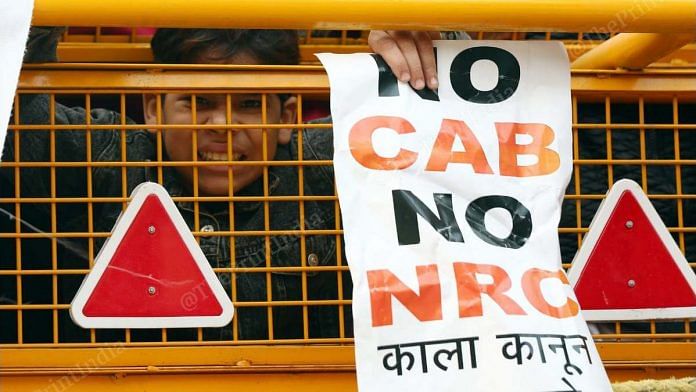New Delhi: Protesters cannot be called “anti-nationals” or “traitors” just because they oppose one law, the Aurangabad bench of the Bombay High Court observed Thursday as it quashed a magistrate’s order denying permission for holding a protest against the Citizenship Amendment Act (CAA).
The court was hearing a petition filed by Iftekhar Zakee Shaikh, who wanted to hold peaceful demonstrations at old Idgah Maidan at Majalgaon in Maharahstra’s Beed district. Shaikh’s request was, however, turned down by Beed’s additional district magistrate.
The bench, comprising Justices T.V. Nalawade and M.G. Sewlikar said, “This court wants to express that such persons cannot be called as traitors, anti-nationals only because they want to oppose one law. It will be act of protest and only against the Government for the reason of CAA.”
Also read: How kind strangers helped me file story after CAA protests led UP to shut internet down
The high court highlighted the fact that people have the right to express themselves under Article 19 of the Constitution and quashed the magistrate’s orders.
In doing so, it took critical note of the magistrate’s order, which it said, appeared to be specifically against those wanting to protest against CAA.
“It can be said that though the order on face appears to be against everybody, in reality the order is against persons who want to agitate, to protest against CAA. At present such agitations are going on everywhere and there was no whisper of agitations of other nature in this region. Thus, it can be said that there was no fairness and the order was not made honestly,” it observed.
The petitioner was then granted permission to hold an indefinite protest against CAA in the area.
In response, the additional public prosecutor assured the court that necessary protection would be provided to those who want to protest. The court, however, noted that the authorities had “undertaken to see that no slogans will be raised against the country, against any religion, against the unity and integrity of the country”.
Here are a few notable observations from the court order:
Also read: Beyond secularism & fascism: CAA gives opportunity to re-imagine clichés about idea of India
People’s fundamental right to express themselves
In such matters the Court needs to consider whether fundamental rights of citizens are breached by the order under challenge. In view of the nature of the order, one needs to see the rights given under Article 19 and 21 of the Constitution of India. If the persons agitating believe that it is against the ‘equality’ provided under Article 14, they have the right to express their feelings as provided under Article 19 of the Constitution of India. They may feel that it will not be possible for them to enjoy the fundamental rights due to such act, they cannot enjoy ‘life’ as mentioned in Article 21 of the Constitution of India as interpreted by the Hon’ble Apex Court. In such a case it not a matter of belief of Judicial Officer presiding over a particular Court when the matter is being decided but it is a matter of belief of the persons who want to raise grievance by starting such agitation. In such a case the ground of the respondent like possible problem of law and order cannot be considered by the Court particularly for reason that it involves the exercise of fundamental right.
People from all religions are protesting together
It is already mentioned that many persons of all the religion and all the communities are agitating to oppose the aforesaid act. In preamble there is a mention of fraternity. The circumstance that the persons of other communities, religions are supporting the minority community show that we have achieved fraternity to great extent. Doing something against this will hurt the fraternity and will create danger to the unity of the country.
Bureaucracy needs to be sensitised on human rights
The bureaucracy needs to keep in mind that when the citizens who believe that particular act is an attack on their rights which were achieved by freedom struggle and when it is against the provisions of Constitution which people have given to themselves, they are bound to defend that right. If they are not allowed to do so, the possibility of use of force is always there and the result will be violence, chaos, disorder and ultimately the danger to the unity of this country. That seriousness needs to be kept in mind by the bureaucracy while making such orders. This Court is observing with all possible seriousness that officers from bureaucracy who are vested with powers of aforesaid nature need to be sensitized by giving them proper training on human rights which are incorporated as fundamental rights in the constitution.
Also read: Who represents India’s Muslims? Thanks to CAA protests, we now know the answer



